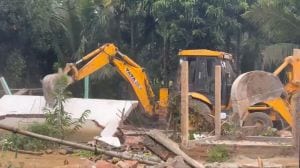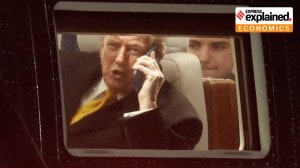Elevating Bharat as ‘Global Soft Power’: BJP manifesto talks about promoting legacy of Lord Ram in all countries
The BJP manifesto was peppered with Prime Minister Narendra Modi’s photos with world leaders, including US President Joe Biden, French President Emmanuel Macron among others.
 Prime Minister Narendra Modi, along with Uttar Pradesh Chief Minister Yogi Adityanath and RSS Sarsanghchalak Mohan Bhagwat, at the consecration ceremony of the new idol inside the Ram temple in Ayodhya. (PTI)
Prime Minister Narendra Modi, along with Uttar Pradesh Chief Minister Yogi Adityanath and RSS Sarsanghchalak Mohan Bhagwat, at the consecration ceremony of the new idol inside the Ram temple in Ayodhya. (PTI)IN ITS election manifesto released on Sunday, the BJP has called for establishing Thiruvalluvar Cultural Centres globally and preserving and promoting the legacy of “Lord Ram”.
On a day when the tension between Iran and Israel escalated, the BJP manifesto talked about establishing IMEC (India-Middle-East-Europe-Economic Corridor) to promote “Bharat’s trade interests”. “We will facilitate international movement of trade and services through Bharat by boosting connectivity to Europe via the India-Middle East-Europe Corridor,” it said.
The BJP manifesto was peppered with Prime Minister Narendra Modi’s photos with world leaders, including US President Joe Biden, French President Emmanuel Macron among others.
Under the theme of “elevating Bharat as a Global Soft Power”, the BJP manifesto said, “We will establish Thiruvalluvar Cultural Centres across the globe to showcase Bharat’s rich culture and offer training in yoga, ayurveda, Bharatiya languages, classical music etc.”
“Ramayan is celebrated across the world, particularly in South and South-East Asia. We will launch a global outreach program for documenting and promoting the tangible and intangible legacy of Lord Ram in all countries. We will celebrate Ramayan Utsav with great fervour across the globe to commemorate the Pran Pratishtha of Ram Lalla.”
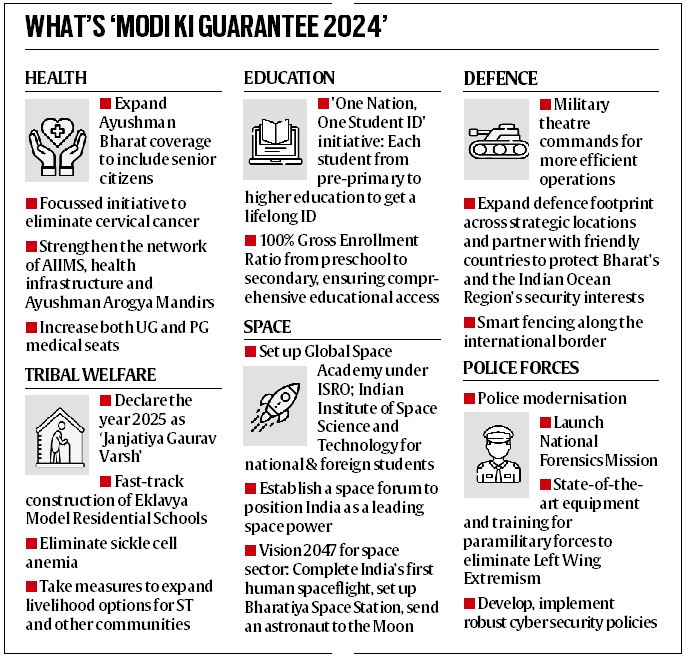 What’s ‘Modi ki Guarantee 2024’
What’s ‘Modi ki Guarantee 2024’
It said that it will further “consolidate Bharat’s position as a Voice of the Global South by using the Prime Minister’s visionary 5S approach of Samman, Samvad, Sahyog, Shanti and Samriddhi”, and “promote Bharat’s reputation as a trusted global partner and a first responder, continuing our humanitarian assistance and disaster relief programmes”.
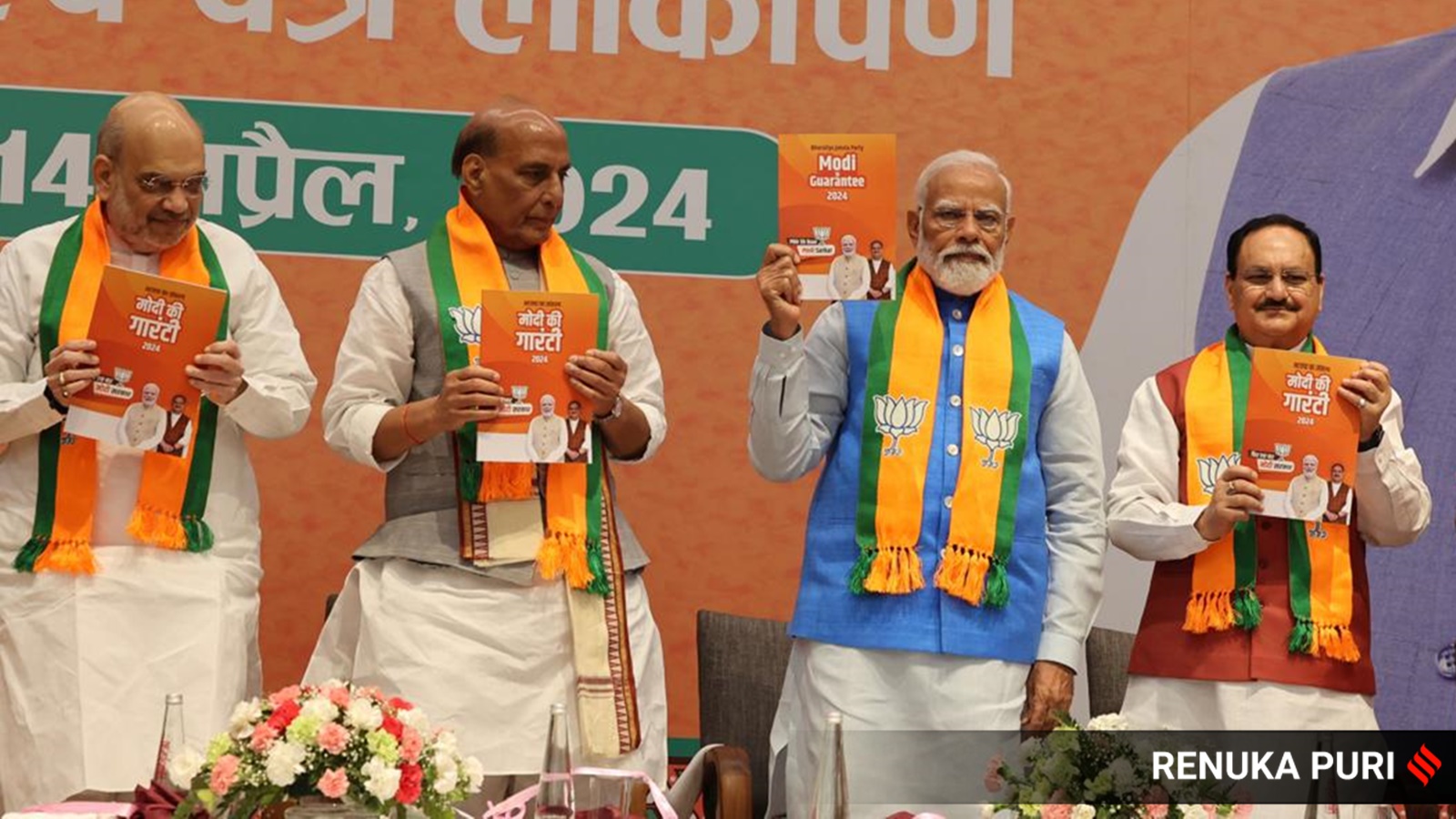 Prime Minister Narendra Modi, Union Home Minister Amit Shah, Defence Minister Rajnath Singh and BJP president J P Nadda unveil BJP’s manifesto on Sunday. (Express Photo)
Prime Minister Narendra Modi, Union Home Minister Amit Shah, Defence Minister Rajnath Singh and BJP president J P Nadda unveil BJP’s manifesto on Sunday. (Express Photo)
It also flagged India’s quest for becoming a Permanent Member of the UN Security Council. “We are committed to seeking permanent membership in the UN Security Council to elevate Bharat’s position in global decision making.”
On creating a global consensus on the fight against terrorism, the BJP manifesto said, “We will continue our efforts to create a consensus among all members of the United Nations on the Comprehensive Convention against International Terrorism and other such efforts to combat terrorism. We will build upon the success of the ‘No Money for Terror’ conference to develop better coordination on countering terrorism financing.”
It also said that it will continue following the “neighbourhood first policy”. “We will continue being a trusted and responsible partner in the subcontinent, promoting regional cooperation and ensuring stability and prosperity.”
It also talked about strengthening maritime vision (SAGAR), and said, “We will continue to collaborate with the countries of the Indo-Pacific Region for the security and growth of all in the Region.”
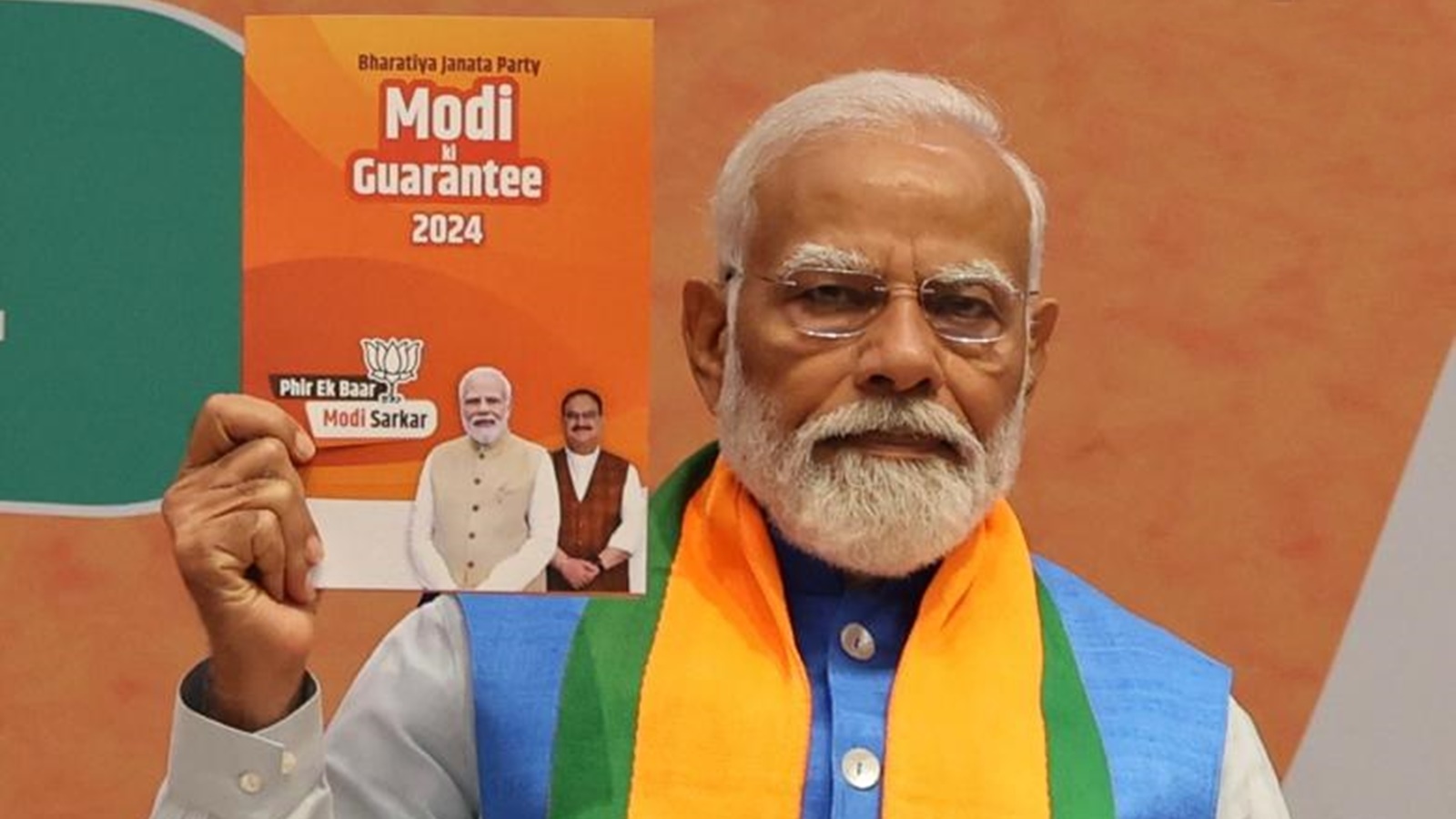 Prime Minister Narendra Modi releasing the BJP’s manifesto for the upcoming Lok Sabha elections. (Express photo by Renuka Puri)
Prime Minister Narendra Modi releasing the BJP’s manifesto for the upcoming Lok Sabha elections. (Express photo by Renuka Puri)
There was no specific mention about Quad or India’s ties with the US in this context.
On terrorism, it said, “In the last ten years, we have taken a firm stand on protecting our country and citizens from the threats of terrorism and naxalism. We have followed a zero tolerance policy on terrorism. We remain committed to keep our country and citizens safe.”
“The Surgical Strikes of 2016 and the Air Strikes of 2019 are examples of our dedicated efforts towards countering terrorism. We are committed to defend Bharat’s citizens and interests at home and abroad from all threats of terrorism,” it said. The Balakot air strikes of 2019 was one of the major talking points in the last Lok Sabha elections.
The manifesto also talked about ensuring robust infrastructure along borders. “The gross neglect by previous governments resulted in poor infrastructure in border areas. We have corrected this grave error and started constructing roads, railway, telecom towers, optical fibre cables and electricity networks. We will accelerate development of robust infrastructure along the Indo-China, Indo-Pakistan and Indo-Myanmar borders. We will introduce technological solutions on fenced portions to make fencing smarter.”
The reference to “Indo-China” is to the India-China border, and not the Indo-China region — which is modern-day south-east Asia.



- 01
- 02
- 03
- 04
- 05








